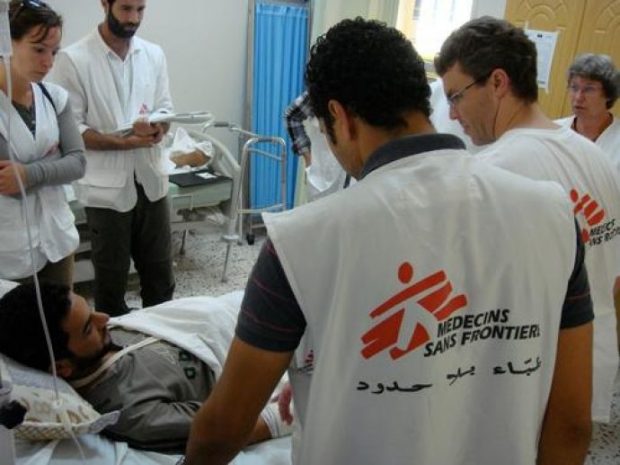MSF demands Libya end arbitrary detention of migrants and asylum seekers

Libyan authorities must immediately end the arbitrary detention of refugees, asylum-seekers, and migrants, the international medical humanitarian organization Doctors Without Borders/Médecins Sans Frontières (MSF) said today, decrying the dire, unhealthy, and abusive conditions in detention centers.
For more than one year, MSF medical teams have been treating people arbitrarily held in detention centers in Tripoli nominally under the control of the Libyan Ministry of Interior. More than one thousand detainees are treated monthly for respiratory tract infections, acute watery diarrhea, scabies, lice, and urinary tract infections. The medical conditions are directly caused or aggravated by squalid detention conditions and ill treatment.
“Detainees are stripped of any human dignity, exposed to abusive treatment and lack adequate access to medical care,” said Dr.Sibylle Sang, a medical advisor for MSF. “Every day we see how much unnecessary harm is being caused by detaining people in these conditions. But there is only so much we can do to ease the suffering.”
Many detention centers have limited natural light and ventilation and are dangerously overcrowded. The amount of space per detainee is so limited that people are unable to stretch out at night. Food shortages have caused acute malnutrition in adults, with some patients requiring urgent hospitalization.
With no rule of law in Libya, the detention system is harmful and exploitative. There is a disturbing lack of oversight and regulation and no basic legal and procedural safeguards to ensure that detainees are not tortured or ill-treated.
Some people treated by MSF report being forcibly returned to Libya and placed in detention centers by the Libyan Coast Guard, after trying to flee across the Mediterranean.
Once people are inside a detention center there is no way to track them, making close monitoring and follow-up of patients extremely difficult. From one day to the next, people can be transferred between different detention centers or moved to undisclosed locations. Some patients disappear without a trace. The medical care MSF is able to provide in these circumstances is extremely limited.
Access to the detention centers is restricted when clashes take place between heavily armed militias in Tripoli. In addition, the management of the detention centres can change overnight and MSF must renegotiate access to patients held inside. Other detention centers remain inaccessible to MSF due to violence and insecurity.
Increased international funding to Libya alone is not the solution to alleviating the suffering of refugees and migrants held in detention centers, said MSF. A narrow focus on improving detention conditions risks legitimizing and perpetuating a system in which people are detained arbitrarily, without recourse to the law, and exposed to harm and exploitation.
See more in the photo report released today: “Human Suffering: Inside Libya’s migrant detention centres”
For the past year, MSF has been providing lifesaving and primary healthcare to refugees, asylum-seekers, and migrants detained in Tripoli. If security conditions allow and if it is considered safe to do so, medical teams visit seven different detention centers nominally under the control of the Ministry of Interior on a weekly basis. Since activities started in June 2016, teams have visited a total of 16 detention centers. There are other detention centers that remain inaccessible for MSF teams due to ongoing violence and insecurity.
In Misrata, MSF is providing healthcare to refugees and migrants held in four detention centers. Each month medical teams provide about 100 medical consultations and refer detainees in need of further medical assistance to secondary and tertiary healthcare facilities. MSF recently opened mobile clinics in Misrata and further south to provide medical and humanitarian assistance to migrants and refugees outside official detention centers.
MSF has worked in Libya since 2011 to support the health system, which has been affected by renewed war and an ensuing economic recession. To help public health structures which struggle with shortages of medicines and staff, MSF continues to respond with donations and other support. Responding to the needs of communities affected by the conflict, MSF is also providing pediatric, gynecological and obstetric care, as well as mental health services, in Benghazi.
How to submit an Op-Ed: Libyan Express accepts opinion articles on a wide range of topics. Submissions may be sent to oped@libyanexpress.com. Please include ‘Op-Ed’ in the subject line.
- HoR-Backed Government moves to end fuel subsidy - December 26, 2024
- Libya and Algeria bolster customs cooperation - December 24, 2024
- Reports claim S-400, S-300 missiles moved to Libya - December 24, 2024


